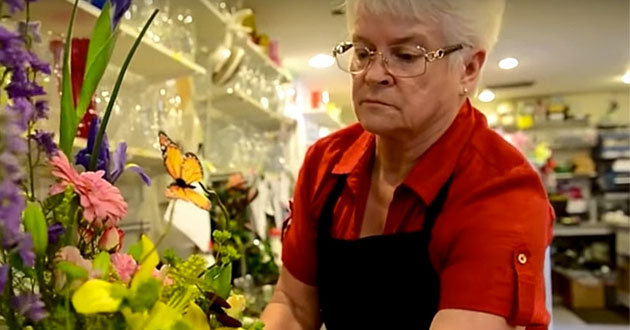Flower shop owner Baronelle Stutzman will champion religious freedom at the Washington Supreme Court tomorrow in a lawsuit charging she discriminated against a gay customer. Ingersoll v. Arlene’s Flowers represents one of a handful of cases making their way to the U.S. Supreme Court, which will determine whether business owners can operate according to the constitutional guarantees of free speech, free exercise of religion, and freedom of expression.
In a 2015 ruling against Stutzman, a lower court judge determined a private business owner’s free speech and free exercise rights must be subordinate to Washington’s nondiscrimination law. Kristen Waggoner, senior counsel for Alliance Defending Freedom and Stutzman’s attorney, called the decision unconstitutional and “ludicrous.”
But Washington Attorney General Robert Ferguson, who filed the initial complaint against Stutzman in 2013, doubled down on the lower court ruling in his brief to the state’s high court.
“For as long as there have been laws prohibiting discrimination, people have sought to evade those laws by claiming a right to discriminate,” he wrote. “The defendants here ask this court to issue an unprecedented ruling exempting them from Washington’s Consumer Protection Act (WCPA) and allowing them to discriminate.”
Waggoner disputes that interpretation. In addition to the supremacy of the U.S. Constitution over state law, federal high court precedent prohibits forced speech. She will argue Stutzman and other business owners in the creative services industry cannot be compelled to affirm something—through speech or creative design—that is at odds with their deeply held religious convictions.
Stutzman knew long-time client Rob Ingersoll was gay and in a relationship with another man. She never refused to sell him flowers. But when Ingersoll asked her to create floral arrangements for his wedding, Stutzman said she could not pour her artistic talents into an event she knew violated the biblical teaching about marriage.
If the Washington attorney general and the American Civil Liberties Union prevail in their case against her, Stutzman could lose all business and personal assets, except her house. Both entities are suing her professionally, as the owner of Arlene’s Flowers, and personally. Waggoner said the attorneys’ fees alone would be financially ruinous.
Washington’s high court justices will hear arguments in Ingersoll v. Arlene’s Flowers at Bellevue College, just east of Seattle. The change of venue is part of a 30-year-old educational program designed to make the high court experience accessible to state residents. Waggoner said the venue is “in the heart of the most left portion of Seattle” and anticipates demonstrations from supporters on both sides of the case. That could make for an interesting and unpredictable environment for the hearing, she said.
Waggoner hopes the hearing in the 300-seat auditorium will give people the opportunity “to hear the truth … and see this is about ideas, not a person.”
Both the ACLU and the conservative Family Policy Institute of Washington are urging people to attend. Joseph Backholm, Family Policy president, is optimistic hundreds of Stutzman’s supporters will pack the hearing and prayer vigil.
Backholm said his organization has worked since 2013 to educate Washington residents about the case and the distinction between a business owner’s refusal to serve an individual versus an event.
“It’s an easy distinction for the public to make,” he told me.
That’s the argument made by business owners like Stutzman, who have for years served clients regardless of their sexual orientation. A year before Stutzman’s case, Jack Phillips, owner of Masterpiece Cakeshop in Denver, Colo., faced a suit for refusing to create a cake for a same-sex wedding. ADF filed an appeal to the U.S. Supreme court in July. Waggoner said the high court should decide by January whether to hear Masterpiece Cakeshop v. Craig.
If the court refuses to hear that case, Ingersoll v. Arlene’s Flowers—and others—wait in the wings. A few of the lawsuits also making their way to the high court include: Aaron and Melissa Klein, former owners of Sweet Cakes by Melissa, who have appealed to the Oregon Court of Appeals; Blaine Adamson, owner of Hands On Originals, won his case in the lower court but pro-LGBT plaintiffs have appealed to the Kentucky Court of Appeals; and Judge Ruth Neely is awaiting a ruling in her case from the Wyoming Supreme Court.
Waggoner said all of the cases share a common ideal: The right to live by, work by, and champion an idea at odds with the majority opinion in a pluralistic society without fear of government repercussions.
“That is what is at risk in this case,” she said.
— by Bonnie Pritchett | WNS

